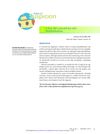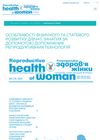 September 2023 in “Deleted Journal”
September 2023 in “Deleted Journal” Lifestyle changes improve reproductive function and hormonal balance in obese women with PCOS.
 November 2022 in “The Journal of Clinical Endocrinology and Metabolism”
November 2022 in “The Journal of Clinical Endocrinology and Metabolism” Postmenopausal hyperandrogenism, a condition with symptoms like increased hair growth and acne, is usually caused by PCOS but can also be due to other factors. It's diagnosed by checking testosterone levels and treated either by removing the adrenal tumor or through antiandrogen therapy.
 117 citations,
May 2017 in “Human Reproduction Update”
117 citations,
May 2017 in “Human Reproduction Update” The update highlights that non-classic congenital adrenal hyperplasia is common in women with excess male hormones, requires specific hormone tests for diagnosis, and has various treatment options depending on age and symptoms.
 October 2021 in “Turkderm”
October 2021 in “Turkderm” Hormonal imbalances, not insulin resistance or dyslipidemia, may be more important in causing acne in women over 25.
 883 citations,
August 2016 in “Nature Reviews Disease Primers”
883 citations,
August 2016 in “Nature Reviews Disease Primers” Polycystic Ovary Syndrome (PCOS) is a common condition in women that can cause metabolic, reproductive, and psychological issues, and requires lifestyle changes and medication for management.
 6 citations,
April 2019 in “Journal of Pediatric Endocrinology and Metabolism”
6 citations,
April 2019 in “Journal of Pediatric Endocrinology and Metabolism” Metformin improved menstrual cycle regularity and signs of hyperandrogenism in adolescent girls with type 1 diabetes but did not improve blood sugar control.
 12 citations,
October 2004 in “Experimental Gerontology”
12 citations,
October 2004 in “Experimental Gerontology” Changes in testosterone and estrogen receptor genes can affect how men age, influencing body fat, hair patterns, and possibly leading to skin disorders.
 May 2024 in “International Journal of Advanced Academic Studies”
May 2024 in “International Journal of Advanced Academic Studies” Vitamin E helps reduce PCOS symptoms and improves hormonal balance.
6 citations,
July 2018 in “DOAJ (DOAJ: Directory of Open Access Journals)” A woman had a rare liver tumor causing male-like physical changes, highlighting the need for thorough checks when such symptoms appear.
 1 citations,
January 2018 in “Pediatrics in review”
1 citations,
January 2018 in “Pediatrics in review” A 7-year-old boy with a brain tumor developed early puberty, which was successfully treated with medication.
 12 citations,
July 2020 in “DOAJ (DOAJ: Directory of Open Access Journals)”
12 citations,
July 2020 in “DOAJ (DOAJ: Directory of Open Access Journals)” Men with hormonal imbalances similar to PCOS may have increased risk of metabolic and heart diseases.
 1 citations,
November 2023 in “Journal of ovarian research”
1 citations,
November 2023 in “Journal of ovarian research” Agaricus subrufescens improves ovarian function and biochemical health in rats with PCOS.
 July 2024 in “Reproductive health of woman”
July 2024 in “Reproductive health of woman” Girls conceived via assisted reproductive technologies show early puberty signs and larger ovaries.
280 citations,
May 2005 in “Andrology” Testosterone treatment for older men can have short-term benefits, but long-term risks are unclear, requiring careful evaluation and monitoring.
 32 citations,
January 1990 in “Clinical Endocrinology”
32 citations,
January 1990 in “Clinical Endocrinology” Women with female pattern hair loss have higher levels of certain androgens, suggesting increased androgen exposure to hair follicles.
 15 citations,
August 2017 in “Scientific Reports”
15 citations,
August 2017 in “Scientific Reports” Young men with early hair loss have slightly worse blood sugar and fat levels, suggesting possible health risks and need for monitoring.
 62 citations,
April 2013 in “Steroids”
62 citations,
April 2013 in “Steroids” PCOS symptoms change with age; younger women have higher androgen levels and less metabolic issues, while older women face more metabolic challenges despite milder PCOS symptoms.
 46 citations,
December 1992 in “Journal of Investigative Dermatology”
46 citations,
December 1992 in “Journal of Investigative Dermatology” Minoxidil decreases LH expression, while hydralazine has mixed effects on prolyl and lysyl hydroxylase activities.
 August 2022 in “Journal of Contemporary medical practice”
August 2022 in “Journal of Contemporary medical practice” Combining Traditional Chinese Medicine and Western medicine can improve symptoms, hormone levels, and pregnancy outcomes in Polycystic Ovary Syndrome patients, but more research is needed.
 1 citations,
May 2013 in “Journal of the Egyptian Women's Dermatologic Society (Print)”
1 citations,
May 2013 in “Journal of the Egyptian Women's Dermatologic Society (Print)” Women with idiopathic hirsutism and PCOS have higher RBP4 levels, and PCOS is linked to greater insulin resistance; weight management may help both conditions.

Resveratrol improved hormone levels, menstrual cycles, hair loss, and ovarian function in PCOS patients.
 April 2016 in “Annals of laboratory medicine”
April 2016 in “Annals of laboratory medicine” The method reliably profiles eicosanoids and shows epitestosterone reduces their levels, similar to common anti-inflammatory drugs.
 47 citations,
August 2000 in “Endocrine Reviews”
47 citations,
August 2000 in “Endocrine Reviews” The document concludes that more research is needed to understand excessive hair growth in women with normal hormone levels and regular ovulation.
 September 2022 in “Curēus”
September 2022 in “Curēus” The removed ovarian tumor was a rare type of blood vessel tumor that improved the patient's symptoms and hormone levels after surgery.
 20 citations,
January 2012 in “International Journal of Trichology”
20 citations,
January 2012 in “International Journal of Trichology” Most cases of excessive hair growth in women are caused by polycystic ovarian syndrome and are linked to higher free testosterone levels.
 32 citations,
July 2001 in “Endocrine Practice”
32 citations,
July 2001 in “Endocrine Practice” Insulin-sensitizing drugs like metformin can help with ovulation, weight loss, and lower testosterone in some women with PCOS.
 99 citations,
August 2003 in “Fertility and Sterility”
99 citations,
August 2003 in “Fertility and Sterility” Too much male hormone is the main cause of Polycystic Ovary Syndrome.
 48 citations,
February 2008 in “Nutrition in Clinical Practice”
48 citations,
February 2008 in “Nutrition in Clinical Practice” Dietary changes, including weight loss and a balanced diet, are important for managing PCOS, especially in overweight women.
 8 citations,
June 2017 in “Hormone Molecular Biology and Clinical Investigation”
8 citations,
June 2017 in “Hormone Molecular Biology and Clinical Investigation” Mild thyroid issues don't affect the metabolism and hormones of women with PCOS.
 23 citations,
July 1989 in “Postgraduate medical journal”
23 citations,
July 1989 in “Postgraduate medical journal” Spironolactone did not make hair thinner in women with excess hair growth.




























